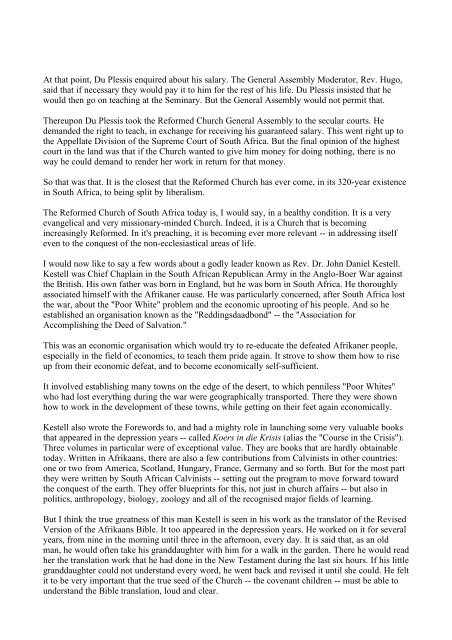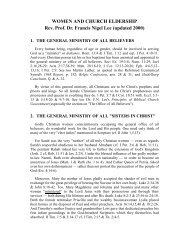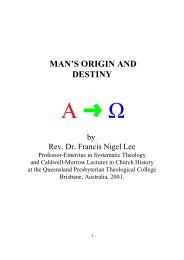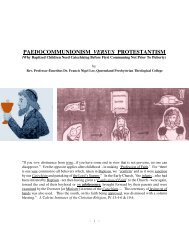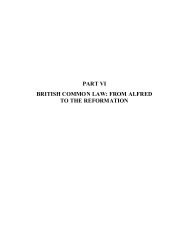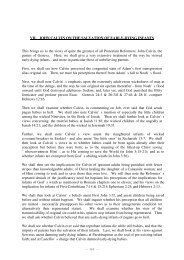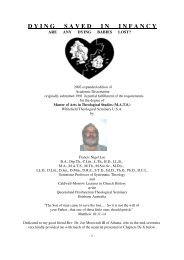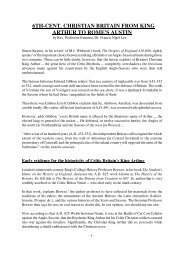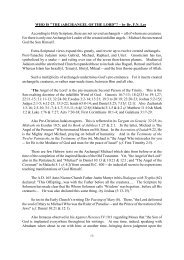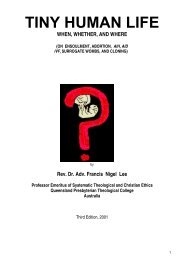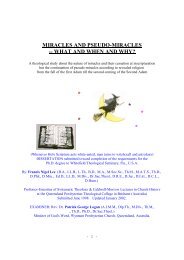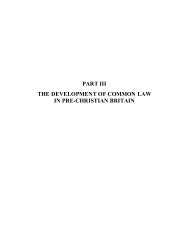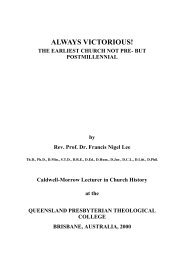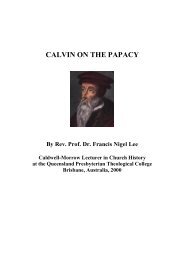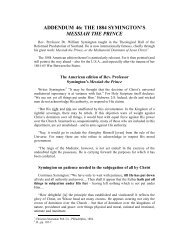THE CHRISTIAN AFRIKANERS - The Works of F. N. Lee
THE CHRISTIAN AFRIKANERS - The Works of F. N. Lee
THE CHRISTIAN AFRIKANERS - The Works of F. N. Lee
You also want an ePaper? Increase the reach of your titles
YUMPU automatically turns print PDFs into web optimized ePapers that Google loves.
At that point, Du Plessis enquired about his salary. <strong>The</strong> General Assembly Moderator, Rev. Hugo,said that if necessary they would pay it to him for the rest <strong>of</strong> his life. Du Plessis insisted that hewould then go on teaching at the Seminary. But the General Assembly would not permit that.<strong>The</strong>reupon Du Plessis took the Reformed Church General Assembly to the secular courts. Hedemanded the right to teach, in exchange for receiving his guaranteed salary. This went right up tothe Appellate Division <strong>of</strong> the Supreme Court <strong>of</strong> South Africa. But the final opinion <strong>of</strong> the highestcourt in the land was that if the Church wanted to give him money for doing nothing, there is noway he could demand to render her work in return for that money.So that was that. It is the closest that the Reformed Church has ever come, in its 320-year existencein South Africa, to being split by liberalism.<strong>The</strong> Reformed Church <strong>of</strong> South Africa today is, I would say, in a healthy condition. It is a veryevangelical and very missionary-minded Church. Indeed, it is a Church that is becomingincreasingly Reformed. In it's preaching, it is becoming ever more relevant -- in addressing itselfeven to the conquest <strong>of</strong> the non-ecclesiastical areas <strong>of</strong> life.I would now like to say a few words about a godly leader known as Rev. Dr. John Daniel Kestell.Kestell was Chief Chaplain in the South African Republican Army in the Anglo-Boer War againstthe British. His own father was born in England, but he was born in South Africa. He thoroughlyassociated himself with the Afrikaner cause. He was particularly concerned, after South Africa lostthe war, about the "Poor White" problem and the economic uprooting <strong>of</strong> his people. And so heestablished an organisation known as the "Reddingsdaadbond" -- the "Association forAccomplishing the Deed <strong>of</strong> Salvation."This was an economic organisation which would try to re-educate the defeated Afrikaner people,especially in the field <strong>of</strong> economics, to teach them pride again. It strove to show them how to riseup from their economic defeat, and to become economically self-sufficient.It involved establishing many towns on the edge <strong>of</strong> the desert, to which penniless "Poor Whites"who had lost everything during the war were geographically transported. <strong>The</strong>re they were shownhow to work in the development <strong>of</strong> these towns, while getting on their feet again economically.Kestell also wrote the Forewords to, and had a mighty role in launching some very valuable booksthat appeared in the depression years -- called Koers in die Krisis (alias the "Course in the Crisis").Three volumes in particular were <strong>of</strong> exceptional value. <strong>The</strong>y are books that are hardly obtainabletoday. Written in Afrikaans, there are also a few contributions from Calvinists in other countries:one or two from America, Scotland, Hungary, France, Germany and so forth. But for the most partthey were written by South African Calvinists -- setting out the program to move forward towardthe conquest <strong>of</strong> the earth. <strong>The</strong>y <strong>of</strong>fer blueprints for this, not just in church affairs -- but also inpolitics, anthropology, biology, zoology and all <strong>of</strong> the recognised major fields <strong>of</strong> learning.But I think the true greatness <strong>of</strong> this man Kestell is seen in his work as the translator <strong>of</strong> the RevisedVersion <strong>of</strong> the Afrikaans Bible. It too appeared in the depression years. He worked on it for severalyears, from nine in the morning until three in the afternoon, every day. It is said that, as an oldman, he would <strong>of</strong>ten take his granddaughter with him for a walk in the garden. <strong>The</strong>re he would readher the translation work that he had done in the New Testament during the last six hours. If his littlegranddaughter could not understand every word, he went back and revised it until she could. He feltit to be very important that the true seed <strong>of</strong> the Church -- the covenant children -- must be able tounderstand the Bible translation, loud and clear.


